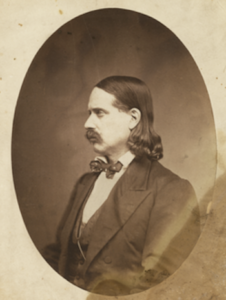
Sylvanus B. Lowry
*Sylvanus B. Lowry was born on this date in 1824. He was a white-American 19th-century political boss, slave owner, newspaper publisher, and pioneer.
Born in Princeton, Kentucky, Lowry's father was David Lowry, a Scottish-American Cumberland Presbyterian minister and missionary to the Winnebago people in northeast Iowa. In 1847, the Lowry family followed the Winnebago as the state forcibly moved them to a new Reservation surrounding Long Prairie, Minnesota. Lowry settled in Brockway Township along the Mississippi River. He moved to St. Cloud in 1853. His success as a fur trader enabled him to build a large mansion there. His father, sister Elizabeth, and her husband also migrated to St. Cloud by 1854.
Lowry enslaved people with him as laborers. Initially, Lowry ran an extensive and very profitable network trading with the Indians for furs. Lowry became active in the Democratic Party in the territory. He was elected to the Minnesota Territorial Council, serving from 1852 to 1854. the town council voted him council president of the newly incorporated city in 1856. He is well known in Minnesota folklore for his conflict with the abolitionist newspaper publisher Jane Grey Swisshelm and her newspaper, the St. Cloud Visiter. The paper repeatedly attacked him for his slaveholding as well as for allegedly defrauding the Winnebago people, damaging his political influence.
He started a rival paper, The Union, to offset her paper's opinions. More slave-owning Southerners entered the state after 1857 when the U.S. Supreme Court ruled in the Dred Scott case and the Missouri Compromise against slavery. Active in the state party, Lowry wanted to be Lieutenant Governor. Although the numbers of slaves were not high, several counties around and including St. Cloud had populations of slaves brought by Southerner vacationers before the American Civil War. When the war broke out, most of the Southerners left, taking their slaves with them.
According to historian Christopher Lehman — Christopher P. Lehman, Slavery's Reach (2019), The Majority of Minnesotans opposed making slavery legal in their territory. Some wanted the practice abolished nationwide, but most opponents did not want the economic competition that slavery threatened. Minnesota's government officials did not want wealthy slaveholders to replace them as the territory's political leaders and working-class laborers did not want competition with slave labor to cause their wages to decline. Sylvanus Lowry was elected to the Minnesota State Senate in 1862. He died of cancer in St. Cloud on December 21, 1865.